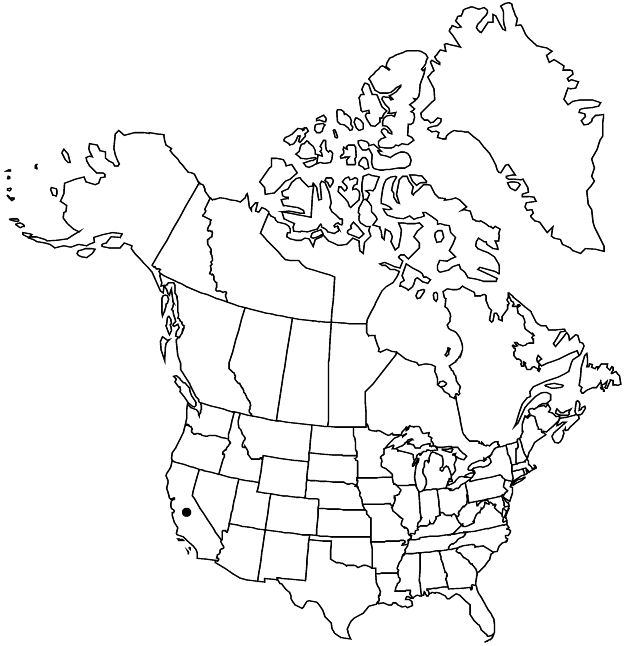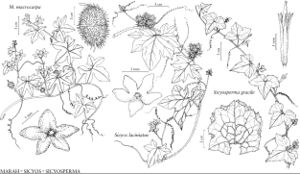Difference between revisions of "Marah macrocarpa"
Leafl. Bot. Observ. Crit. 2: 36. 1910.
FNA>Volume Importer |
imported>Volume Importer |
||
| (3 intermediate revisions by 2 users not shown) | |||
| Line 10: | Line 10: | ||
|special_status={{Treatment/ID/Special_status | |special_status={{Treatment/ID/Special_status | ||
|code=F | |code=F | ||
| − | |label= | + | |label=Illustrated |
}} | }} | ||
|basionyms={{Treatment/ID/Basionym | |basionyms={{Treatment/ID/Basionym | ||
|name=Echinocystis macrocarpa | |name=Echinocystis macrocarpa | ||
|authority=Greene | |authority=Greene | ||
| + | |rank=species | ||
|publication_title=Bull. Calif. Acad. Sci. | |publication_title=Bull. Calif. Acad. Sci. | ||
|publication_place=1: 188. 1885 | |publication_place=1: 188. 1885 | ||
| Line 33: | Line 34: | ||
|elevation=0–1500(–2100) m | |elevation=0–1500(–2100) m | ||
|distribution=Calif.;Mexico (Baja California;Baja California Sur). | |distribution=Calif.;Mexico (Baja California;Baja California Sur). | ||
| − | |discussion=<p>K. M. Stocking (1955b) enlarged <i>Marah macrocarpa</i> to include <i>M. micrantha</i> Dunn [as <i>M. macrocarpa</i> < | + | |discussion=<p>K. M. Stocking (1955b) enlarged <i>Marah macrocarpa</i> to include <i>M. micrantha</i> Dunn [as <i>M. macrocarpa</i> <i></i>var.<i> micrantha</i> (Dunn) Stocking], which is known only from</p><!-- |
--><p>Cedros Island off the Pacific coast of Baja California, outside of Vizcaíno Bay. But the relatively small flowers and seeds of the latter [staminate flowers 3–6(–8) mm diam. versus 8–13 mm diam.; seeds 12–13 mm versus 15–20 mm] and its apparent geographical disjunction suggest that treatment of <i>M. micrantha</i> at specific rank is justified.</p> | --><p>Cedros Island off the Pacific coast of Baja California, outside of Vizcaíno Bay. But the relatively small flowers and seeds of the latter [staminate flowers 3–6(–8) mm diam. versus 8–13 mm diam.; seeds 12–13 mm versus 15–20 mm] and its apparent geographical disjunction suggest that treatment of <i>M. micrantha</i> at specific rank is justified.</p> | ||
|tables= | |tables= | ||
| Line 43: | Line 44: | ||
-->{{#Taxon: | -->{{#Taxon: | ||
name=Marah macrocarpa | name=Marah macrocarpa | ||
| − | |||
|authority=(Greene) Greene | |authority=(Greene) Greene | ||
|rank=species | |rank=species | ||
| Line 57: | Line 57: | ||
|publication title=Leafl. Bot. Observ. Crit. | |publication title=Leafl. Bot. Observ. Crit. | ||
|publication year=1910 | |publication year=1910 | ||
| − | |special status= | + | |special status=Illustrated |
| − | |source xml=https:// | + | |source xml=https://bitbucket.org/aafc-mbb/fna-data-curation/src/2e0870ddd59836b60bcf96646a41e87ea5a5943a/coarse_grained_fna_xml/V6/V6_34.xml |
|genus=Marah | |genus=Marah | ||
|species=Marah macrocarpa | |species=Marah macrocarpa | ||
Latest revision as of 22:20, 5 November 2020
Leaf blades deeply 5(–7)-lobed, 5–30 cm wide. Flowers: sepals (pistillate) deltate, 0.4–0.6 mm, sometimes vestigial; petals (1–)3–10(–12) mm (pistillate) or 5–8(–10) mm (staminate), corolla white, shallowly cupulate to rotate; staminodia scalelike or absent in pistillate flowers. Capsules yellowish green at maturity, short-ellipsoid to broadly ovoid, usually rounded at both ends, sometimes sharply beaked, (5–)8–12 cm, surface densely echinate, spinules rigid, 5–30 mm. Seeds 4–20(–24), usually obovate to oblong-elliptic, sometimes subglobose, not flat at one end, slightly compressed, 15–20 mm. 2n = 32, 64.
Phenology: Flowering (Jan–)Mar–May.
Habitat: Pinyon-juniper woodlands, Joshua tree-pinyon transition zones, coastal sage, chaparral, oak woodlands, rocky hillsides, riparian woods and thickets, stream bottoms, disturbed sites, roadsides
Elevation: 0–1500(–2100) m
Distribution

Calif., Mexico (Baja California, Baja California Sur).
Discussion
K. M. Stocking (1955b) enlarged Marah macrocarpa to include M. micrantha Dunn [as M. macrocarpa var. micrantha (Dunn) Stocking], which is known only from
Cedros Island off the Pacific coast of Baja California, outside of Vizcaíno Bay. But the relatively small flowers and seeds of the latter [staminate flowers 3–6(–8) mm diam. versus 8–13 mm diam.; seeds 12–13 mm versus 15–20 mm] and its apparent geographical disjunction suggest that treatment of M. micrantha at specific rank is justified.
Selected References
None.
